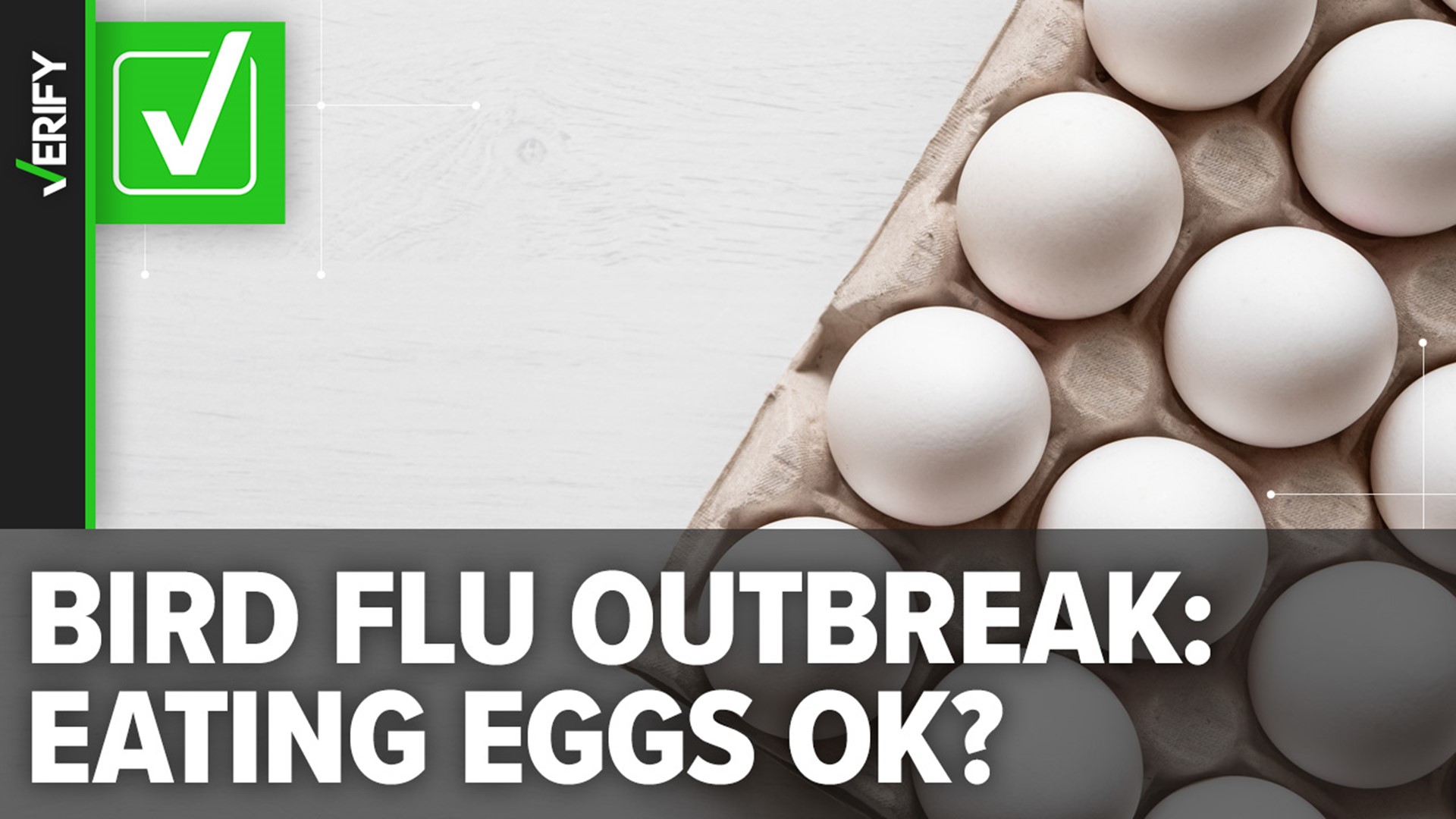On April 5, the Centers for Disease Control and Prevention (CDC) issued a health alert to inform the public, state health departments and healthcare providers of a second person in the United States who caught bird flu after being exposed to livestock. The current risk these viruses pose to the public remains low, the CDC says.
This strain of bird flu has been detected in wild birds in nearly every state, as well as commercial poultry operations and backyard flocks. It’s called highly pathogenic avian influenza (HPAI) A(H5N1).
Nationwide, millions of chickens have either died or been killed to prevent the potential spread of the virus.
With the spread of the bird flu, people have wondered whether it’s safe to eat eggs. This X post says eggs should be “fully cooked” before eating. Google search trends show people have been asking questions like: Is it safe to eat eggs now with the bird flu? Can bird flu survive cooking? What are the chances of contracting bird flu from a properly cooked chicken and egg?
THE QUESTION
Is it safe to eat eggs during the bird flu outbreak?
THE SOURCES
- Centers for Disease Control and Prevention (CDC)
- Darin Detwiler, an associate teaching professor of food policy at Northeastern University
- Huaijun Zhou, professor of animal science at the UC Davis College of Agricultural and Environmental Sciences
- Marc Dresner, American Egg Board communications director
- Egg Safety Center
- The Food & Drug Administration (FDA)
- United States Department of Agriculture (USDA)
- Pennsylvania Department of Health
THE ANSWER
Yes, it is safe to eat eggs during the bird flu outbreak. Government regulators always recommend fully cooking eggs to reduce the risk of getting any type of illness from eggs.
WHAT WE FOUND
Eggs are safe to eat amid the bird flu outbreak, experts tell VERIFY. Fully cooking eggs reduces the small chance of contracting any illness, including salmonella.
While an infected hen could pass the virus to an egg, the chance of being exposed to bird flu through eggs bought from the grocery store is also incredibly low, according to the Food and Drug Administration (FDA).
In a 2010 United States Department of Agriculture (USDA) report on the bird flu and the estimated risk of human exposure, if the avian influenza were detected in a flock of egg-laying hens, more than 99.99% of eggs that are hypothetically infected with the virus would be identified and removed before getting to store shelves. Those eggs “would still be in the distribution chain at the time of diagnosis and not yet be available for consumers to purchase,” the report says.
The USDA also says the chance of infected poultry or eggs entering the food chain is extremely low because of safeguards in place that prevent infected products from reaching store shelves.
“Additionally, when food is properly prepared and stored, the risk of consumers becoming infected with [bird flu] is reduced even further,” the FDA says.
“Consumers can be confident in the safety of eggs. There is no evidence that bird flu can be transmitted to humans through properly prepared food, including eggs,” Marc Dresner, communications director for the American Egg Board, told VERIFY in an email.
The CDC says “properly cooked” or fully cooked eggs are eggs cooked to a temperature of 165 F. That temperature kills bacteria or viruses, including bird flu. At that temperature, there is no runniness and the yolks are firm.
The CDC also advises eggs should be properly cooked in order to prevent other bacteria-based illnesses like salmonella.
Darin Detwiler, an associate teaching professor of food policy at Northeastern University, says he always advises people to avoid undercooked eggs in order to prevent illness. He said the chances of contracting bird flu from a properly cooked egg are “virtually nonexistent.”
“With the H5N1 [bird flu] concern, the risk isn't primarily about the bird flu virus, as cooking eggs to the right temperature can kill viruses and bacteria. However, undercooked eggs, such as those that are sunny side up, might not reach the temperature required to kill pathogens,
Detwiler told VERIFY.
“Bottom line - It's always wise to err on the side of caution. During an H5N1 outbreak, ensuring eggs are thoroughly cooked can minimize any risk, however small, of exposure to the virus,” Detwiler said.
According to a fact sheet about bird flu published by the Pennsylvania Department of Health, bird flu can also be found on the outer surfaces of eggshells, so foods should be cleaned and handled properly.
“General hygiene procedures should be applied, such as washing hands once contacting eggs,” Huaijun Zhou, professor of animal science at the UC Davis College of Agricultural and Environmental Sciences, told VERIFY
Zhou and Detwiler told VERIFY farm fresh eggs are also safe if cooked and handled properly.
Zhou said if the eggs are fresh, less than one week old under cool temperature, they can be treated the same as ones bought from the grocery store for cooking.
At the time of publication, there were no reported recalls of eggs because of bird flu infection.
The Associated Press contributed to this report.
This story is also available in Spanish / Lee este artículo también en español: Sí, es seguro comer huevos durante el brote de gripe aviar












